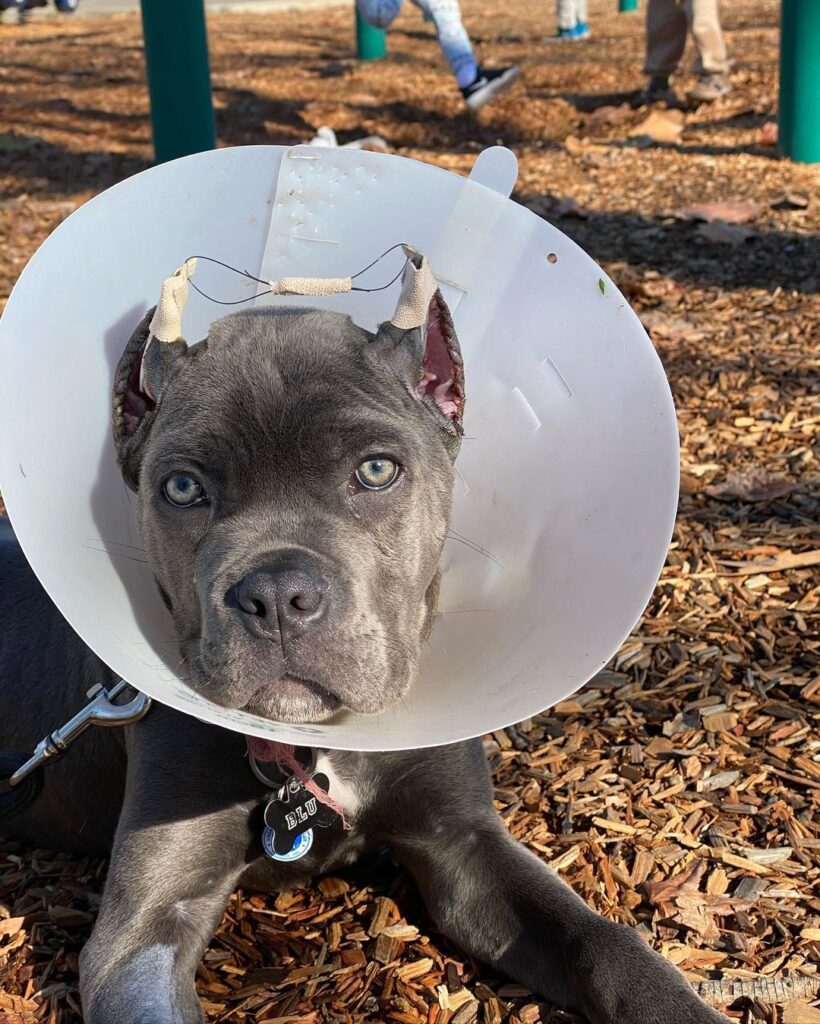
Caring for a pregnant Cane Corso is an exciting but responsible journey. These magnificent dogs deserve the best care during this crucial time. In this comprehensive guide, we’ll cover the signs of pregnancy, how to recognize them, and how to confirm if your beloved Cane Corso is expecting.
What are the signs of a pregnant Cane Corso?
Before you can embark on the journey of caring for a pregnant Cane Corso, it’s essential to identify the early signs of pregnancy. These signs can be subtle but are vital for ensuring the health and well-being of your pet.
Recognizing the Early Signs
Cane Corsos, like other dogs, exhibit certain behaviors and physical changes during early pregnancy. One of the first signs is a change in behavior. Your typically active and lively Cane Corso may become more affectionate or, conversely, show signs of fatigue and decreased activity. Some may even experience morning sickness.
Physical changes are also telltale signs. As early as three weeks into pregnancy, you may notice slight weight gain, nipple enlargement, and a slightly enlarged abdomen. However, keep in mind that these signs can vary from dog to dog.
Confirming Pregnancy
While the behavioral and physical signs may strongly suggest pregnancy, the only definitive way to confirm it is through a visit to the veterinarian. Vets can conduct ultrasound scans, palpate the abdomen, or run hormone tests to confirm pregnancy. It’s crucial to consult a professional for this confirmation, as it’s the first step in providing proper care for your pregnant Cane Corso.
How to Take Care of a Pregnant Cane Corso?
Caring for a pregnant Cane Corso is a rewarding but demanding responsibility. Ensuring the well-being of your beloved pet during pregnancy is paramount. In this guide, we’ll explore the essential aspects of taking care of a pregnant Cane Corso, including proper nutrition, exercise, rest, and monitoring her health.
Proper Nutrition
During pregnancy, your Cane Corso’s nutritional needs change significantly. Providing the right balance of nutrients is crucial for her health and the health of her developing puppies. Consult your veterinarian for a suitable diet plan. Expectant Cane Corsos typically require high-quality dog food rich in protein and essential nutrients. You may also need to incorporate supplements recommended by your vet.
| Nutrient | Purpose | Sources |
|---|---|---|
| Protein | Muscle growth and repair | High-quality dog food, lean meats, fish |
| Fat | Energy source, skin health | Quality dog food, fish oil, flaxseed oil |
| Carbohydrates | Energy source | Grains (rice, oats), vegetables |
| Fiber | Digestive health |
Exercise and Rest
Maintaining an appropriate level of exercise is essential for a pregnant Cane Corso. While exercise is necessary, ensure it’s in moderation to prevent overexertion. Regular, gentle walks can help keep her muscles toned. Additionally, provide comfortable resting areas, as she’ll need extra sleep and relaxation during this time. A cozy, quiet spot where she can rest undisturbed is ideal.
Monitoring Health
Regular vet check-ups are essential throughout your Cane Corso’s pregnancy. Your vet will monitor her health, assess the puppies’ development, and address any potential complications. Keep an eye out for signs of discomfort or unusual behavior. If you notice anything concerning, don’t hesitate to contact your veterinarian.
Monitoring her weight is also important. A gradual increase in weight is expected, but excessive weight gain can be a sign of a problem. Discuss weight management with your vet.
Cane Corso Pregnancy Stages Week by Week
Understanding the various stages of pregnancy in your Cane Corso is crucial for providing the best care possible. Each week brings unique developments and needs. In this guide, we’ll delve into the three primary pregnancy stages week by week: Early Pregnancy (Week 1-4), Mid-Pregnancy (Week 5-8), and Late Pregnancy (Week 9+).
Week 1-4: Early Pregnancy
During the first four weeks, your Cane Corso may not show visible signs of pregnancy. However, critical changes are happening. Fertilization and implantation occur during this period, with the embryos attaching to the uterine lining. It’s essential to maintain your dog’s regular diet during this time.
Around week three, you might begin to notice subtle behavioral changes, such as increased affection or nesting behavior. As the weeks progress, your Corso may experience morning sickness, leading to a temporary loss of appetite. Be patient and provide small, frequent meals to ensure she gets the nutrition she needs.
Week 5-8: Mid-Pregnancy
In mid-pregnancy, the embryos develop into fetuses. Your Cane Corso’s abdomen will gradually enlarge, and her nipples will become more prominent. This is the time to start adjusting her diet, providing higher-calorie dog food to support fetal growth. Consult your vet for dietary recommendations and supplements.
Continue with regular, gentle exercise to keep her muscles toned, but avoid strenuous activity. As your Corso enters her sixth week, prepare a comfortable whelping box where she can give birth and care for her puppies. Keep a watchful eye for any signs of discomfort or unusual behavior.
Week 9+: Late Pregnancy
In the final weeks of pregnancy, your Cane Corso’s belly will be noticeably larger, and she may become more restless. These are signs that labor is approaching. Set up a quiet, comfortable whelping area and monitor her closely. Watch for signs of labor, such as nesting behavior and increased body temperature.
Late pregnancy is a critical time for your Corso’s health and well-being. Ensure she has access to fresh water and continues to eat well. Frequent vet check-ups are essential to address any potential complications and ensure a smooth delivery.
At What Age Can a Cane Corso Get Pregnant?
The age at which a Cane Corso can get pregnant is a crucial consideration for responsible dog owners and breeders. While these magnificent dogs may reach sexual maturity relatively early, it’s essential to understand the right age for breeding to ensure the health and well-being of the mother and her puppies.
Reproductive Maturity
Cane Corsos, like many dog breeds, reach reproductive maturity earlier than their full physical and emotional maturity. On average, a female Cane Corso will enter her first heat cycle, also known as estrus, at around 6 to 9 months of age. However, it’s essential to note that this can vary from dog to dog.
Breeding should not occur during the first heat cycle. It’s advisable to wait until the Cane Corso is at least 18 to 24 months old before considering breeding. This delay allows the dog to reach a more mature physical and emotional state, reducing the risk of complications during pregnancy and ensuring better outcomes for both the mother and her puppies.
Responsible breeders also take into account other factors before breeding, such as the dog’s overall health, genetic traits, and temperament. Breeding should aim to improve the breed and adhere to ethical breeding practices that prioritize the well-being of the dogs.
How Many Times Can a Cane Corso Get Pregnant?

Understanding the optimal frequency for breeding a Cane Corso is essential for the health and well-being of these majestic dogs. Responsible breeding practices aim to strike a balance between preserving the breed and safeguarding the reproductive health of individual dogs.
Reproductive Health
Reproductive health is a critical aspect of a Cane Corso’s overall well-being. Breeding should be approached with care and consideration for the dog’s health. While there is no fixed limit to how many times a Cane Corso can get pregnant, responsible breeders prioritize the dog’s health over the number of litters produced.
Frequency of breeding should consider several factors:
- Age: A Cane Corso should be at least 18 to 24 months old before considering breeding. This allows them to reach physical and emotional maturity, reducing the risk of complications.
- Health: The dog’s overall health should be in optimal condition before breeding. Regular vet check-ups are essential to ensure the dog is fit for pregnancy.
- Recovery: After giving birth, a Cane Corso needs time to recover. Breeding back-to-back litters without adequate recovery time can be detrimental to her health.
- Genetics: Ethical breeding practices aim to improve the breed. Breeding should be done with careful consideration of the dog’s genetic traits and lineage.
- Responsible Stewardship: Responsible breeders prioritize the well-being of the dogs over profit. They limit the number of litters to ensure the health and happiness of their dogs.
It’s crucial to consult with a veterinarian or experienced breeder to determine the best breeding schedule for your Cane Corso. Breeding should not be done impulsively but rather as part of a well-thought-out plan to contribute positively to the breed while safeguarding the individual dog’s health.
FAQs
Q: How can I tell if my Cane Corso is pregnant?
A: Look for changes in behavior and physical signs, or consult a vet for confirmation.
Q: What dietary adjustments should I make for a pregnant Cane Corso?
A: Adjust her diet with high-quality dog food, supplements, and a proper feeding schedule.
Q: Can a pregnant Cane Corso continue regular exercise?
A: Yes, but in moderation. Exercise is important, but avoid strenuous activity.
Q: What are some signs of complications during Cane Corso pregnancy?
A: Watch for symptoms like excessive vomiting, bleeding, or discomfort, and consult your vet.
Q: When does a Cane Corso reach reproductive maturity?
A: Typically, Cane Corsos reach puberty around 6 to 9 months, but breeding should be delayed until they are at least 18-24 months old.
Q: How often can a Cane Corso be bred?
A: Responsible breeding allows for fewer litters to ensure the health and well-being of the dog. Consult with a vet or breeder for guidance.
Q: What should I do to prepare for Cane Corso labor?
A: Set up a comfortable whelping box and be prepared for signs of labor, such as nesting behavior and increased body temperature.
Q: Are home pregnancy tests reliable for Cane Corsos?
A: Home pregnancy tests for dogs are available but may not be as accurate as a vet’s evaluation.
Q: Can I spay my Cane Corso after one pregnancy?
A: Yes, spaying after one pregnancy is an option if you do not plan to breed her further. Consult your vet for the best timing.
Q: What is the average gestation period for Cane Corsos?
A: Cane Corsos typically have a gestation period of about 63 days, but it can vary slightly.
Conclusion
In conclusion, caring for a pregnant Cane Corso is a rewarding journey that demands careful attention and dedication. Throughout this guide, we have explored various aspects of pregnancy in Cane Corsos, from recognizing early signs to ensuring proper nutrition and health monitoring. These majestic dogs deserve the best care during this crucial time, and responsible pet ownership is paramount.
Understanding the signs of pregnancy, making necessary dietary adjustments, providing appropriate exercise and rest, and monitoring your Corso’s health are all essential components of ensuring a smooth and healthy pregnancy. Remember that each week of pregnancy brings unique developments, and consulting with a veterinarian is crucial for confirmation and ongoing guidance.
With over 4 years of devoted companionship with my beloved Labrador Retriever, Robin, I have cultivated a deep understanding and expertise in all things canine. From training and behavior to health and well-being.


